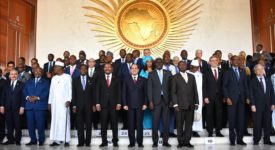Human rights are a condition for legitimate sovereignty. Effective migration management can and should go hand-to-hand with rule of law and human rights. The Global Compact on Migration formally aims at reducing the incidence and negative impacts of irregular migration through more international cooperation on regular migration. While there is not a 100% direct correlation between establishing more regular pathways for immigration and effectively overcoming irregular immigration in destination countries, the lack of regular channels often constitutes a key factor in people falling into irregularity or attempting irregular and dangerous paths of entry and residence.
2018 was expected to witness the finalisation of the inter-governmental processes of negotiation on the United Nations (UN) Global Compact on Migration and Refugees. The Global Compact process was officially launched by the UN New York Declaration for Refugees and Migrants by the UN General Assembly in 2016, where all heads of state and government committed to join forces and coordinate their actions in dealing with the global phenomenon of large movements of refugees and migrants in full compliance with international law and human rights.
However, in December 2017, the Trump administration announced the withdrawal of the US, alleging that it would undermine “the sovereign right of the United States to enforce our immigration laws and secure our borders”. Similar hesitations have more recently emerged from some EU member states. The first to express disagreement was the Hungarian government of Viktor Orbán, which exited the Compact in October 2018 stating that the document is at odds with Hungary’s security interests and “in conflict with common sense and also with the intent to restore European security”.
The Austrian government of Sebastian Kurz declared in October 2018 that it would not sign the Compact because “migration is not and should not become a human right”, and “we decide who comes into Austria and no one else”. The list is growing, with the Slovak parliament deciding to reject the Compact, which has led to the resignation of the country’s Foreign Minister. The Global Compact on Migration has also been subject to heated internal political debates in other EU member states such as Germany, Estonia, Croatia, the Netherlands, Slovenia or Belgium.
Last in the line of defecting member states is Italy, whose Interior Minister Matteo Salvini announced that the country would not take part in the Marrakech conference and only sign the document if its Parliament votes in favour of the text. The reactions by EU member state governments and their ministries of interior have been regretted by the European Commission, which declared that “those countries that decided they are leaving the UN migration compact, had they read it, they would not have done it”.
The UN Special Representative for International Migration Louise Arbour has stated that this “reflects very poorly on those who participated in negotiations. All EU member states must stick to their international commitments to respect human rights while managing migration. The signature of the Global Compact does not change that well established obligation. By not signing the Global Compact on Migration, EU countries are in reality calling or allowing for more irregular immigration. They will therefore end up having ‘less control or sovereignty’ domestically over cross-border mobility. Moreover, by refusing to participate in the UN Migration Compact, EU member states contradict EU commitments in the area of legal migration.
‚Some EU Governments Leaving the UN Global Compact on Migration: A Contradiction in Terms?‘ – Policy Paper by Sergio Carrera, Karel Lannoo, Marco Stefan and Lina Vosyliute – Centre for European Policy Studies / CEPS.







